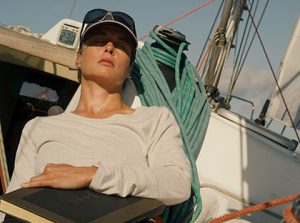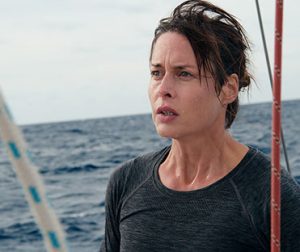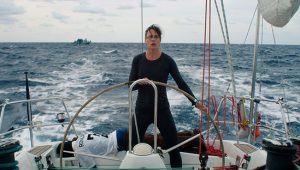‘Styx’ tackles morality on the high seas
“Styx” (2018 production, 2019 release). Cast: Susanne Wolff, Gedion Odour Wekesa, Felicity Babao (voice), Alexander Beyer (voice). Director: Wolfgang Fischer. Screenplay: Wolfgang Fischer and Ika Künzel. Web site. Trailer.
When confronted with difficult situations, most of us probably do our level best to do the right thing. Were we to do otherwise, we’d likely have trouble living with ourselves, so earnestly taking steps to accommodate the circumstances often comes naturally, almost like a knee-jerk reaction. But what do we do when we’re faced with something particularly troubling, a scenario in which we’re up against seemingly impossible odds? Such circumstances push us to take a hard look at ourselves to see just how far we’ll go, a conundrum faced by a woman with her back against the wall in the new high seas drama, “Styx.”
To get away from the high-stress conditions of her everyday life, Rieke (Susanne Wolff), a determined, self-assured emergency room physician, embarks on a long-cherished dream of sailing solo from Gibraltar to Ascension Island in the south central Atlantic. The independently minded thirty-something German doctor has spent a great deal of time preparing for the trip, equipping her yacht with ample supplies and charting her course in exacting detail. It would seem she’s ready for just about any contingency, a wise decision given what she’s planning to undertake.
Despite the potential challenges that await her, Rieke looks forward to her journey. She’s eager to see the remote, little-visited island, particularly its distinctive vegetation, most of which was imported after one of its first visitors, Charles Darwin, reported that it had little of its own native plant life. In many ways, Ascension subsequently evolved as a sort of botanical laboratory, making it one of the most unusual and unique environments on the planet. It promises to be quite the adventure. But, not long after Rieke sets sail, the adventure proves to be more than what she bargained for.

German emergency room physician Rieke (Susanne Wolff) sets off on the adventure of a lifetime when sailing solo from Gibraltar to Ascension Island in the gripping new oceanic saga, “Styx.” Photo courtesy of Beta Cinema.
As Rieke sets out on her voyage, she basks in the beautiful weather and looks forward to smooth sailing. However, upon making radio contact with the communications officer of a nearby freighter (Alexander Beyer), she learns that a storm lies ahead, necessitating her to batten down the proverbial hatches. And, when the bad weather hits, it proves to be quite a challenge to stay afloat, not only because of its intensity, but also because it strikes at night. But, nature’s fury aside, Rieke manages to keep her craft upright and survives to sail on.
Not long after the storm passes, however, Rieke encounters another challenge: she spots a decrepit African refugee ship that’s taking on water and slowly sinking, with an estimated 100 passengers aboard. She reports the overloaded vessel to the Coast Guard, asking the officer (Felicity Babao) what she should do. The officer thanks Rieke for reporting the incident but sternly orders her to take no further action, warning her that getting involved could conceivably make the situation worse. She also tells Rieke not to worry, assuring her that Coast Guard assistance is on the way.
The officer’s response doesn’t sit well with Rieke. As she watches the sinking ship from afar, she witnesses its passengers growing ever more desperate, some of them even leaping into the water in futile hopes of escaping the doomed vessel. Her instinctive desire to help kicks in, but, again, she’s advised to steer clear, despite the increasingly dire drama unfolding before her. And the more time passes with no sign of a Coast Guard rescue party, Rieke grows progressively frustrated. She maintains a discrete distance but feels compelled to take action. After all, as a doctor, she believes she’s got to do something for those who are clearly suffering.

Upon the sighting of a sinking African refugee ship, solo sailor Rieke (Susanne Wolff) struggles with what course of action to take in director Wolfgang Fischer’s award-winning new release, “Styx.” Photo courtesy of Beta Cinema.
Before long, Rieke’s hand is called when one of the refugees jumps ship and begins swimming toward her boat. The sickly, injured teenager (Gedion Odour Wekesa) struggles to reach her vessel, collapsing once he’s on deck. Rieke attends to his medical needs, hoping to stabilize his condition. And, as she awaits her patient to respond to treatment, she agonizes over officialdom’s quite obvious indifference to the plight of those in need of help.
However, even if she wanted to get more directly involved, there’s little that Rieke could realistically do to assist the other refugees. Her sailboat is far too small to accommodate all of the remaining passengers. And, considering this limitation, how could she possibly be the one to decide who gets saved and who doesn’t? Yet standing by and doing nothing is no answer, either. Rieke struggles to devise a solution, a problem that’s made more complicated when her patient regains consciousness and hysterically demands that she do something.
With no sign of the Coast Guard coming to the refugees’ aid, Rieke finally takes matters into her own hands. To say what she does would reveal too much, but suffice it to say that her truly innovative solution carries a tremendous cost for those involved. Nevertheless, impossible situations often call for improbable approaches to arrive at agreeable outcomes.
Such are the circumstances that characterize this morality play on the high seas. It’s a story driven by an array of ideas, reflected through the beliefs held by each of the principal players, both seen and unseen. And how the scenario plays out is directly dependent on those various notions, for they form the basis of the conscious creation process, the philosophy that maintains we manifest the reality we experience through the power of our thoughts, beliefs and intents.
This multifaceted saga most obviously involves the fate of the refugees, but there are other aspects of this tale that are just as important, even if not as plainly apparent. Where the primary story thread is concerned, there are multiple belief outlooks in play – those of the authorities, whose concern is questionable at best, those of Rieke, which are clearly driven by compassion, and those of the refugees, who have ostensibly created through these conditions a test of character for their would-be rescuers. Resolution will depend on which beliefs hold sway, a circumstance that fundamentally means multiple outcomes are ultimately possible, one of the core concepts that defines the functioning of the conscious creation process.

While attending to an injured African refugee (Gedion Odour Wekesa, laying on deck), physician and sailor Rieke (Susanne Wolff, standing) struggles to help those in need while awaiting help from a noticeably absent Coast Guard rescue party in “Styx.” Photo courtesy of Beta Cinema.
Based on the conversations and events here, sadly, the attitudes of officialdom are quite telling, presumably reflective of the beliefs underlying them. The authorities are only too willing to assist an affluent White European woman but unconcerned in coming to the aid of a group of Black African refugees, women and children included. Politically correct rhetoric and pronouncements aside, the actions of officials here thus speak volumes about what their real views are.
But this question is not the only issue put to the test in this situation. Rieke’s personal character is challenged by what’s unfolding around her, forcing her into addressing issues like transformation, innovation, sacrifice and salvation, both for those she’s trying to help as well as for herself. How she views the events at hand will determine her responses, which, in turn, will further alter her beliefs and what subsequently stems from them. It’s a very fluid situation as she assesses the conditions and attempts to come up with solutions for attending to them. It not only calls forth traits she already possesses, but it also pushes the emergence of others, including some of which she may have previously been unaware, enabling her to evolve in ways she may not have envisioned when she embarked on her journey. She may find that surprising. But, then, given her projected destination – Ascension Island, a locale distinguished by its own exploration of the concept of evolution – her character-testing experience with the refugees is an ironically fitting reflection of that idea where she’s concerned personally.
This is particularly noteworthy where the question of responsibility is concerned. Rieke is already well versed in this subject given her profession. However, with what she’s up against on the high seas, this notion gets pushed to a new level. In this case, her actions veer into the territory of taking a stand to make a difference, forging a safety net essentially from scratch, despite the perilous potential consequences, in light of an apathetic bureaucracy that fails to live up to its own responsibility. In doing so, she needs to surpass the limitations at hand, drumming up new solutions to suit the unparalleled circumstances she now faces.
In addition to these considerations, the film is loaded with religious symbolism fitting to the story. First there’s the title, “Styx,” a reference to the river the deceased traversed in journeying to the Underworld in Greek mythology, an appropriate symbol for a life and death situation taking place on water. From the story itself, there’s Rieke’s experience with the storm, an event that serves as her own “dark night of the soul” experience, one in which she’s tested on the resilience of her faith in herself and in the assumed support of the Universe. And then there’s Rieke’s stated destination, “Ascension” Island, a place whose name reflects the transformative nature of her journey, a designation that metaphorically embodies the divine ascendancy attained by Christ after a life of salvation and compassion toward others, acts that Rieke unhesitatingly engages in herself when circumstances warrant. These narrative enhancements aren’t intended to evangelize audiences, but they add nuance to the story, strengthening the film’s prevailing viewpoints, ultimately making for a more powerful and more meaningful picture, one worthy of the introspection it was designed to engender.

Despite some occasional pacing issues, this fact-based, richly symbolic drama sizzles with quiet intensity against the backdrop of beautiful ocean scenery. The picture’s thoughtfully constructed script leaves viewers with much to ponder, some of it inspiring, some of it unsettling, but you’re sure not to come away from this one feeling neutral. Susanne Wolff’s superb portrayal of a woman pitted against the perils of nature and the difficulty of hard choices is riveting from start to finish. Director Wolfgang Fischer’s minimalist approach suits the story perfectly, especially when enlivened by its positively gorgeous cinematography. There’s a good chance that this consuming release will leave you drained, and incensed, but also, one would hope, uplifted.
“Styx” has primarily been screening on the film festival circuit, where it has garnered numerous awards and nominations. A limited theatrical release is currently under way as well; check your local film listings and the film’s web site for details. And, by the way, those who dislike reading subtitles should note that, even though this is a German-Austrian co-production, most of the dialogue is in English.
Our ability to take the interests of others into account is often seen as one of the traits that separates us from the animals. Self-interest is assumed to be substituted by selflessness. But, as this film shows, that may not always be the case; it’s a point on which we might well fail. Thankfully, though, there are those who believe in living up to that loftier aspiration, even when the going gets tough. That’s one of those qualities that defines us as humans – and that puts the “human” in “humanity.” Let’s hope we never lose sight of that.
Copyright © 2018-19, by Brent Marchant. All rights reserved.




Leave A Comment